TeaM Energy elevates quality of education through CSR programs
In the Philippines, access to quality education remains a challenge for many students, particularly in public schools. With limited resources and lacking infrastructure, students often struggle to learn and reach their full potential. However, corporate social responsibility (CSR) programs have emerged as a powerful tool for private companies to contribute to the improvement of the education sector.
With the belief that education is a critical enabler for sustainable development, TeaM Energy has implemented several initiatives that aim to enhance access to quality education in underprivileged communities in the country.
By prioritizing education as a key focus area, TeaM Energy, through its social development arm TeaM Energy Foundation Inc. (TEFI), has partnered with the local government, public schools, and other private organizations in order to implement high-impact education programs in the provinces of Quezon and Pangasinan.
Solar Power for Computer Laboratories
One such program that has made a significant impact is TeaM Energy’s solar power initiative for computer laboratories in all public schools in Sual, Pangasinan, that was done in partnership with the Sual local government.
By installing solar home systems, TeaM Energy powered the computer laboratories in all 20 public schools in the town of Sual. Twenty-two (22) units of 4.6 kilowatt-peak grid-tied photovoltaic systems were installed in each of Sual’s public schools. This project reduced the dependence on electricity from the grid, which can be unreliable and expensive in some areas.
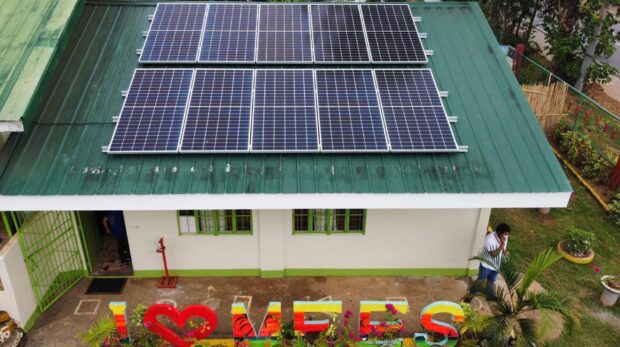
One of the 22 units of 5.6 kilowatt-peak grid-tied solar power systems installed in each of Sual’s public schools. The solar home system powers their computer laboratories and other school equipment.
Each solar power unit is capable of energizing up to eight computer units, providing access to technology that would otherwise be impossible in some areas. The schools can also use the generated electricity to light up facilities and power small equipment like printers and photocopiers when the computer lab is not being used. This results in instant savings for the schools, which can be used for other essential educational resources.
“The solar home system installed in our school has been a great help in reducing our energy costs,” says Carina Untalasco, principal of Sual National High School (SNHS). “Our monthly electricity bill has gone down significantly, freeing up funds that can be used for various needs of our students,” she said.
This initiative also had a significant impact on the students of SNHS. Grade 10 students are now learning to create precise 2D and 3D drawings and models, through a 3D imaging software used for creating electrical diagrams and building construction graphics.
“We are happy that our students are having hands-on experience in computers using advanced software,” shares Rogelio Caturay, Jr. computer teacher at Sual National High School. “By having access to technology, several of our students are considering to pursue college courses related to computer and engineering,” he adds.
By providing access to energy and technology, the project does not only improve the quality of education in Sual, Pangasinan, but also empowers young people to explore their potential and pursue their dreams.
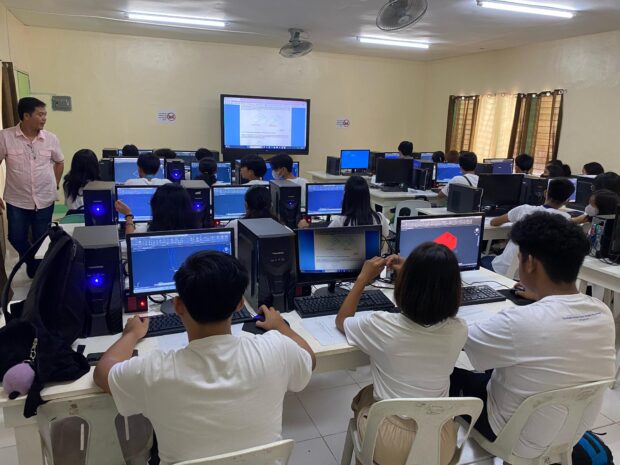
Grade 10 students of Sual National High School learn how to use a 3D software for creating precise 2D and 3D drawings and models, in their school computer laboratory powered by solar energy.
Project SiKaP
As part of TEFI’s Project SiKaP (Silid Aralan tungo sa Katuparan ng mga Pangarap), the construction of a fully-equipped school building in Pangasinan and a multi-purpose facility in Quezon were recently completed.
The new building was constructed in Sioasio Integrated School in Sual, Pangasinan. The building consists of two-fully furnished classrooms that include armchairs, blackboards, teacher’s desks, electric fans, and lighting fixtures. The classrooms also have their own restroom for the convenience of students and teachers. This new facility provides a comfortable learning environment that is conducive to learning, making it easier for teachers to impart knowledge and skills to their students.
In addition to the new school building, TEFI also donated a multi-purpose facility to Lipata Elementary School in Barangay Lipata, Padre Burgos, Quezon. The facility comes complete with a stage, floodlights, and 100 monobloc chairs, making it ideal for various programs and activities held by the school and the barangay. The covered facility also provides a comfortable place for students to gather and learn, even in inclement weather.
“TEFI continues to partner with local government units and different private organizations in helping uplift and improve the country’s education sector,” says Nestor Banga, Program Manager of TEFI. “We hope that these brand new facilities in Pangasinan and Quezon contribute to improving the learning experience of students and teachers,” he adds.
TEFI’s Project SiKaP has successfully constructed high-quality classrooms and school buildings to aid different public schools. Since 2014, TEFI has helped build classroom buildings for 19 public schools and multi-purpose facilities for three public schools.
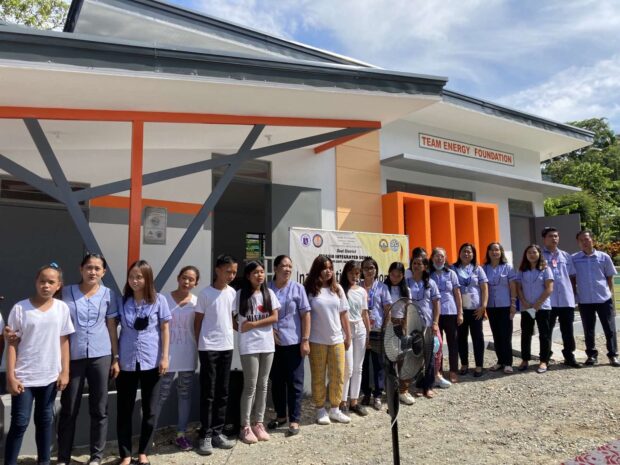
The brand new school building constructed by TeaM Energy Foundation in Sioasio Integrated School in Sual, Pangasinan consists of two-fully furnished classrooms that include armchairs, blackboards, teacher’s desks, electric fans, and lighting fixtures. The classrooms also have their own restroom for the convenience of students and teachers.
Project SURE
TeaM Energy’s commitment to improving education in the Philippines has extended to the establishment of a one-storey training center in Padre Burgos, Quezon. This center is the first of its kind in the third district of Quezon Province and aims to provide out-of-school youth and employable adults with valuable technical skills such as welding, electrical works, and wood works.
Constructed through TEFI’s Project SURE (Skills Upgrade to Raise Employment), the TeaM Energy Training Center is fully-equipped and designed to comply with the rigorous requirements and specifications set forth by the Technical Education and Skills Development Authority or TESDA for certification.
Through this initiative, TeaM Energy is providing a platform for individuals to acquire practical skills that can lead to greater employability and economic opportunities in the future.
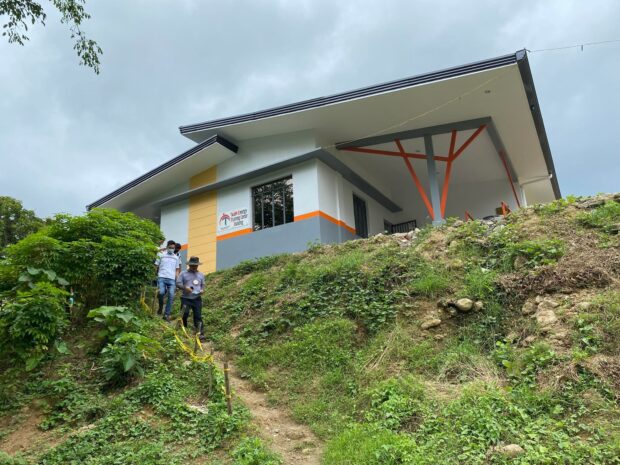
The TeaM Energy Training Center in Padre Burgos, Quezon, aims to provide out-of-school youth and employable adults with valuable technical skills such as welding and electrical works. It is fully-equipped and designed to comply with the rigorous requirements and specifications set forth by TESDA.
Ecoskwela
TEFI’s Ecoskwela, is a project that is making a significant impact in establishing eco-friendly elementary schools in Pangasinan and Quezon. The initiative aims to educate students, teachers, and school staff on various environmental concepts such as solid waste management, biodiversity, water and electricity conservation, recycling, and gardening. In addition, Ecoskwela helps construct Materials Recovery Facilities in participating public elementary schools.
In Pangasinan, Ecoskwela’s current focus is on providing technical assistance to public schools in Sual to help them transition to self-sustaining, eco-friendly schools. Teachers were provided with training workshops to capacitate them on key environmental concepts related to the Seals of the Ecoskwela Program, which include energy, biodiversity conservation, water conservation, and solid waste management. The schools also received materials and equipment for constructing Ecoskwela structures like rainwater collection, vermicomposting, hydroponics, materials recovery facilities, vegetable gardens, and color-coded trash bins. It is worth noting that not all schools received the same materials and equipment, as they were provided based on validated individual school requests and needs.
In Quezon, Ecoskwela focused on Bantigue Elementary School in Pagbilao. In 2022, the project provided a handwashing facility, and is scheduled to participate in training workshops this year.
“By providing public schools with the knowledge and resources that they need to become eco-friendly, Ecoskwela is creating a positive impact on the environment by helping students become responsible stewards of the planet,” shares Deanna Maningding, Program Manager of TEFI. “Through this project, TEFI is actively promoting the importance of environmental sustainability in education,” she ends.
Brigada Eskwela
The Brigada Eskwela program has been helping public schools in the Philippines carry out minor repairs and maintenance work before classes begin. This initiative has encouraged local communities, organizations, and both public and private sectors to come together in support of the education sector.
During the pandemic, TeaM Energy continued its active participation in the Brigada Eskwela program by also providing COVID essentials to different public schools. In the past year, 24 public schools in Pangasinan were given COVID essentials like face masks, alcohol, and disinfecting materials, as well as construction and repair materials to improve their facilities for face-to-face classes.
Similarly, 39 schools in Quezon received the same support, while five schools in Polilio Islands were provided with construction materials and solar lights as part of the relief operations after Typhoon Karding in September 2022.
In Metro Manila, four public schools were given COVID essentials to ensure the safety of students, teachers, and staff.
Water System Installation
TeaM Energy has been making strides in improving access to basic needs in different communities in Pagbilao, Quezon. One such example is the installation of a water facility in Barangay Kanlurang Malicboy, which benefits the parents and children of the day care center in the area.
“In the past, the parents of my students need to fetch water every day to be used in the daycare center,” narrates Jovelyn Malanad, daycare center teacher of Barangay Kanlurang Malicboy. “With the water system in place, it is now very convenient to have running water readily available anytime,” she shares.
In addition to this, TeaM Energy has also installed different water systems in several communities, providing around 5,000 people with access to running water through the development of wells, installation of pumps, construction of water tanks, and laying of pipelines.
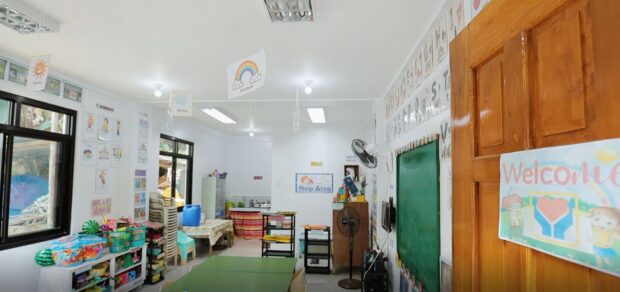
This daycare center in Barangay Kanlurang Malicboy, Pagbilao, Quezon now has access to running water for the hygiene needs of young learners and teachers as a result of TeaM Energy’s installation of a water system in several communities.
Recognition from DepEd
Earlier this year (2023), TeaM Energy was awarded by the Department of Education (DepEd) Division of Quezon for the support it provided to its Adopt-a-School Program. Through the company’s support, thousands of localized reading materials were printed and distributed to public schools all over Quezon. Some of the materials featured local legends and folklore from various Quezon localities. The materials managed to integrate class lessons in the stories, helping serve as supplemental learning materials, as students transitioned to face-to-face classes late in 2022.
In a separate award, DepEd Region IV-A Calabarzon also cited TeaM Energy as one of its valuable private company partners in the region.
“Through our CSR initiatives, we hope to do our share in helping government further improve the quality of education in the Philippines,” said Greggy Romualdez, TeaM Energy’s Head of External Affairs. “With these programs, TeaM Energy aims to positively impact the lives of students, teachers and communities,” he adds.
TeaM Energy operates two coal-fired power plants: the 1,200 MW Sual Power Station in Pangasinan and the 735 MW Pagbilao Power Station in Quezon Province. It also has a 50% stake in the 420 MW Pagbilao Unit 3 Power Project in Quezon.
ADVT.